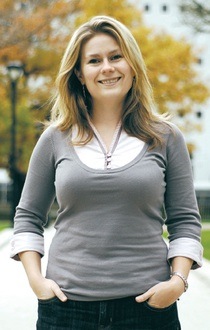
Elaina Mack currently works with the International Institute for Child Rights and Development in Victoria, BC, in her role as project manager for YouthScape, a national initiative that engages young people in projects to build stronger, more resilient communities.
As a graduate student in the school of public policy and administration, Elaina Mack, MA/06, researched the conditions under which non-governmental organizations (NGOs) work and how they influence government and development policy. To do this, she travelled on a graduate research bursary to Tanzania in the summer of 2006, to meet with think-tanks, civil society organizations, donors and foundations.
“I was impressed by what people were doing there, and how resilient they were. Most of the staff that I interviewed had their offices just outside the main city of Dar Es Salaam, in very poor areas. Sometimes they would work with no power or no running water. Most Canadians would stay home from work if that happened, but these people continued to provide services,” says Mack.
She wanted her major research essay, Aiding Policy—Re-Conceptualizing Civil Society Engagement in Tanzania, to be useful to future students and the development field. While her research has been used in Canadian development circles, Mack doesn’t know if it’s been used by the local Tanzanian organizations involved.
“The research has not effectively taken root,” she says. The flaw, she believes, was that while the research was about participation, it wasn’t conducted as participatory action research—the social and collective processes of reflection, planning, action and observation. As a result, the research was hers, and not the community’s.
Mack shares this story because she wants to start a conversation on ways academic research may become more participatory. As a board member of the Participatory Development Forum—an international network of development practitioners, NGOs, academics and action researchers, private sector representatives, and policy makers—and a former researcher with Carleton’s Centre for Voluntary Sector Research and Development and the Carleton Centre for Community Innovation, she advocates marrying community knowledge and discipline-based knowledge.
“Participatory action research does require more creativity, patience and flexibility than conventional research. Yet, I have found that developing relationships, learning new knowledge and skills, and engaging in collective action with communities can be all the more rewarding,” says Mack.
In collaboration with Carleton University and the University of Ottawa and supported by the International Development Research Centre, the Participatory Development Forum presented a two-day conference in September entitled Participation for Social Change: Critical dialogues on local and global possibilities.
The conference was an opportunity for more than 30 graduate students—at the cutting edge of the debates on participatory action research—to showcase their research and network among researchers and local and international development professionals. The goal was to engage students, fostering proactive global citizenship, by linking local actions globally for social change.
“Participation can help us to better understand difficult and multi-faceted problems,” says Mack. “Such research is likely to be more credible, useful and transformative for the communities trying to create meaningful change.”